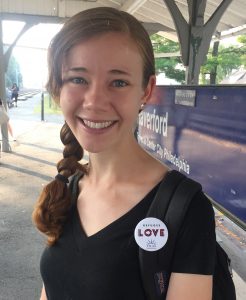This is the next in a series of posts by recipients of the Career Services Summer Funding Grant. We’ve asked funding recipients to reflect on their summer experiences and talk about the industries in which they’ve been spending their summer. You can read the entire series here.
This entry is by Kelley Riffenburgh, GSE ’18
 This summer, although I stayed local, I was able to feel the repercussions of both global and national events and policies. I interned at HIAS Pennsylvania in Philadelphia. The Hebrew Immigrant Aid Society (HIAS) has been around since 1882, working initially to help newly-arrived Jewish immigrants following pogroms. Their doors are open to immigrants and refugees from all over the world now.
This summer, although I stayed local, I was able to feel the repercussions of both global and national events and policies. I interned at HIAS Pennsylvania in Philadelphia. The Hebrew Immigrant Aid Society (HIAS) has been around since 1882, working initially to help newly-arrived Jewish immigrants following pogroms. Their doors are open to immigrants and refugees from all over the world now.
HIAS PA has both a legal department and a resettlement department. I worked with the resettlement team, engaging with a variety of tasks and projects. My work took place in the midst of a flurry of executive orders from President Trump. As we tried to resettle those who face persecution, discrimination, and violence in their home nations, our efforts were complicated by attempts to block many seeking refuge from coming to the United States.
Day-to-day, my role adjusted based on changing circumstances and newly-presented needs. Sometimes I would interact with clients directly, accompanying them to appointments as they navigated the first hours of their new lives in Philadelphia. I met clients from Eritrea, Afghanistan, Ukraine, and Uganda, among other places. Language barriers were frequently present, but clients who had limited English skills often indicated this, and we were able to adopt universal modes of communication, such as gestures and smiles. I had hoped to put my Swahili language skills into use for the organization as well, though I knew the Congolese Swahili I was most likely to encounter could be quite different from the Tanzanian Swahili I’ve spent several years studying. Spotty phone connections and differences in dialect presented me with communicative challenges, but I valued the exposure to Congolese Swahili even though I often had to rely on outside phone interpreters to make sure I was effectively communicating.
Being involved in the planning for Philadelphia’s World Refugee Day celebration was also a highlight, as I worked with HIAS PA staff and volunteers, as well as with other area organizations committed to refugees. The City Hall celebration ended up with great turnout, food, performances, and other activities commemorating refugees’ resilience and their contributions to our community.
Other projects could be frustrating, as I followed lead after lead yet often seemed to hit innumerable dead ends. These tasks included things like trying to find different options for affordable and convenient intermediate/advanced English as a Second Language (ESL) classes, and figuring out which primary care physicians and optometrist offices accepted certain types of insurance and also were able to provide interpretation services. In theory, the medical offices accepting our insurance were required by law to provide interpretation, but this wasn’t always so easy to actually acquire. I sought to remain cognizant of the value of my efforts, knowing that even if I was unable to find the perfect program or doctor, I had at least explored a multiplicity of options, which was useful information in its own way.
Despite some of the external bureaucratic frustrations, it was incredibly rewarding to work at HIAS PA, and I’m so grateful to have had that opportunity this summer.

